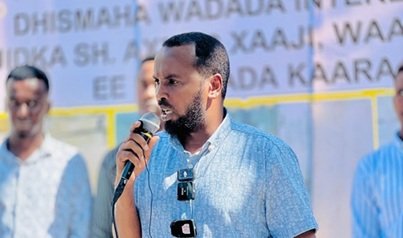Mogadishu (WDN) – In a disturbing escalation of political intolerance, the District Commissioner of Karaan in Mogadishu, Yusuf Adani, has sparked national outrage after publicly calling on residents to attack, kill, and brutalize anyone who opposes the Somali government. His statements, made before a large crowd, are being described as genocidal in tone and dangerously reminiscent of the early warning signs that preceded the 1994 Rwanda genocide.
“If someone opposes the government, attack them in their homes. Kill them, use machetes if needed—you have permission. They’ve been sent by terrorists, break their bones,” declared Adani, who also instructed residents to arrest and beat any dissidents and deliver them to local police stations. These are not just words—they are explicit directives that could incite mass violence.
Adani’s remarks included attacks on ordinary citizens using social media to express concerns about voter registration irregularities. He urged security services to arrest them and promised that the Karaan administration would act as a witness to justify their imprisonment.
Human rights groups, legal experts, and civil society leaders have condemned the language as incitement to mass murder and called for immediate legal action. “This kind of dehumanizing language—labeling critics as terrorists and granting mobs permission to kill—is a direct pathway to atrocities,” said one Mogadishu-based constitutional lawyer.
What has stunned many observers, however, is the silence and tacit tolerance from President Hassan Sheikh Mohamud, under whose watch this rhetoric has flourished. Rather than condemning the statements or suspending Adani, the Presidency has made no move to distance itself from the commissioner’s remarks—raising serious concerns about complicity, or at minimum, political convenience in the face of rising tribal extremism.
Critics accuse President Hassan of fostering a dangerous environment where tribal-based loyalty outweighs the rule of law, and where public officials feel emboldened to threaten violence against citizens without consequence. “If this speech had come from an opposition figure, arrests would already be underway,” said a political analyst in Garowe. Instead, the ruling elite rewards loyalty—even if it’s soaked in blood.”
Yusuf Adani himself has a controversial past. In 2021, he defected from the police leadership under President Farmaajo to join the “Badbaado Qaran” opposition movement, then led by Hassan Sheikh Mohamud. Today, he is one of the president’s staunchest allies, using the full weight of his office to stifle dissent.
Many Somalis are now asking: How far is too far? And if public incitement to murder is not met with accountability, what future awaits Somalia’s fragile democracy?
Legal scholars and human rights defenders are demanding Adani’s immediate arrest and prosecution under both Somali and international law. “This man should be taken to court,” said one lawyer. “And if Somalia’s judiciary won’t act, the international community must.”
As of publication, neither the Office of the President nor the Ministry of Interior has issued a statement on the matter.
Nevertheless, following public uproar over his remarks inciting violence, Adani later issued an apology and publicly retracted his statements.
WDN will continue monitoring this story. Do you believe Somali officials should be held accountable for inciting violence?
WardheerNews


Leave a Reply